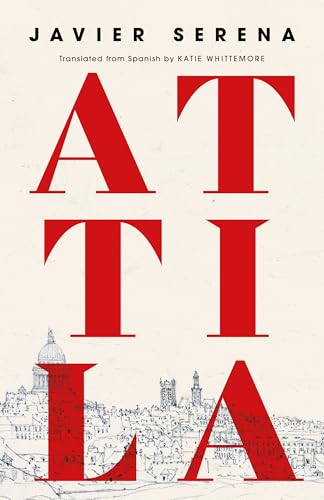Saturday, 21 June 2025
Attila by Javier Serena Review
Aliocha Coll was a 20th century Spanish writer who produced experimental books, of which few were published and those that did failed to connect with a large audience - hence his name being practically unknown today.
In Attila, Javier Serena imagines Coll’s final year alive, writing what he knew would be his last book, Attila, living in abject poverty in Paris, heart broken, mental illness in full control, before he killed himself at age 42 in 1990.
The publisher Open Letter has published both of Katie Whittemore’s translations of the very different novels of the same name, Attila, by their respective authors alongside one another this year. I was drawn to Serena’s book rather than Coll’s because I heard that Coll’s prose was… tough. Which was backed up after reading a sample of it. It’s the kind of writing where you read a sentence, a paragraph, a page, and have absolutely no idea what the author’s banging on about. Think Finnegans Wake. Ugh.
Serena on the other hand is not doing avant-fart bullshit, so I got along with his style a lot better, and I was curious to learn about this obscure writer of which little is known. It sounded like a compelling, if morbid, premise as well. Besides the disappointing Author’s Note at the end that states that nearly everything in the book was made up, so Coll’s life remains a question mark, the story itself just wasn’t that interesting.
Coll was devoted to his art - that intensity with which he approached writing doesn’t seem to have been fabricated - and I feel like there must have been an element of mental illness present to have driven him to such a desperate act in the end.
Otherwise, Serena’s Coll is a painfully lonely chap - his wife left him, his final girlfriend left him, his few friends live abroad and visit him occasionally - and he has a fraught relationship with his horrible father, on whom he is financially dependent. And the dramatic scenes between Coll and his father are the book’s most engaging, as are the narrator’s frank assessments of Coll’s writing (“impenetrable”).
It’s hard to feel sorry for the guy though. He’s such a stubborn, single-minded person to the point of hopeless immaturity. Serena’s Coll 100% believes in the starving artist cliche. That an artist is only true if they devote themselves selflessly to their art. That only great art can be accomplished by sacrificing everything in service to it.
But look at Coll’s legacy: nobody knows who this guy is - and I don’t just mean the author writing about his life, although that seems to be the case too - but most bookish people have never heard of him because his books are terrible. The ones that have been published at least - a number still haven’t been, probably because they’re even less appealing!
Just because you devote yourself to your art doesn’t mean your art is guaranteed to be good - Coll is a perfect example of this. Similarly, those who have day jobs and write in their spare time have as much chance of producing great art as those who are unemployed and focus on their art exclusively. TS Eliot was a bank manager, Kafka worked in insurance and innumerable other authors have worked regular jobs while they wrote the books that would achieve the critical and commercial success that would enable them to write full-time.
I don’t think Serena’s Coll is a bad person but he brings a lot of his own misery onto himself and that childish martyr attitude makes for a largely unsympathetic and trying character. And I understand that Serena’s Coll is not the real Coll, who may have had a wholly separate view on artistic creation, but even if he did it doesn’t change the fact that he’s still basically unknown after pursuing his art as fervently as he did.
Javier Serena is a decent writer - I just don’t think Aliocha Coll is a great subject. Serena’s Attila is about an unremarkable archetype - the starving artist - that he doesn’t do anything especially fresh or unique with here. Attila is sporadically interesting but not consistently enough to make this a good novel.
Labels:
2 out of 5 stars,
Fiction
Subscribe to:
Post Comments (Atom)

No comments:
Post a Comment